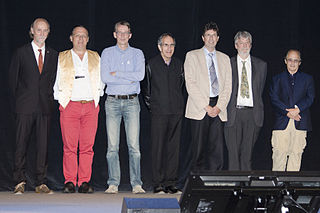
Bioinformatics is an interdisciplinary field that develops methods and software tools for understanding biological data, in particular when the data sets are large and complex. As an interdisciplinary field of science, bioinformatics combines biology, computer science, information engineering, mathematics and statistics to analyze and interpret the biological data. Bioinformatics has been used for in silico analyses of biological queries using mathematical and statistical techniques.

The National Center for Biotechnology Information (NCBI) is part of the United States National Library of Medicine (NLM), a branch of the National Institutes of Health (NIH). It is approved and funded by the government of the United States. The NCBI is located in Bethesda, Maryland and was founded in 1988 through legislation sponsored by Senator Claude Pepper.

The National Institute of General Medical Sciences (NIGMS) supports basic research that increases understanding of biological processes and lays the foundation for advances in disease diagnosis, treatment, and prevention. NIGMS-funded scientists investigate how living systems work at a range of levels, from molecules and cells to tissues and organs, in research organisms, humans, and populations. Additionally, to ensure the vitality and continued productivity of the research enterprise, NIGMS provides leadership in training the next generation of scientists, in enhancing the diversity of the scientific workforce, and in developing research capacity throughout the country.

Biological databases are libraries of biological sciences, collected from scientific experiments, published literature, high-throughput experiment technology, and computational analysis. They contain information from research areas including genomics, proteomics, metabolomics, microarray gene expression, and phylogenetics. Information contained in biological databases includes gene function, structure, localization, clinical effects of mutations as well as similarities of biological sequences and structures.

The SIB Swiss Institute of Bioinformatics is an academic not-for-profit foundation which federates bioinformatics activities throughout Switzerland.
The Gene Ontology (GO) is a major bioinformatics initiative to unify the representation of gene and gene product attributes across all species. More specifically, the project aims to: 1) maintain and develop its controlled vocabulary of gene and gene product attributes; 2) annotate genes and gene products, and assimilate and disseminate annotation data; and 3) provide tools for easy access to all aspects of the data provided by the project, and to enable functional interpretation of experimental data using the GO, for example via enrichment analysis. GO is part of a larger classification effort, the Open Biomedical Ontologies, being one of the Initial Candidate Members of the OBO Foundry.

UniProt is a freely accessible database of protein sequence and functional information, many entries being derived from genome sequencing projects. It contains a large amount of information about the biological function of proteins derived from the research literature. It is maintained by the UniProt consortium, which consists of several European bioinformatics organisations and a foundation from Washington, DC, United States.
The Protein Information Resource (PIR), located at Georgetown University Medical Center (GUMC), is an integrated public bioinformatics resource to support genomic and proteomic research, and scientific studies.It contains protein sequences databases
Biomedical text mining refers to the methods and study of how text mining may be applied to texts and literature of the biomedical and molecular biology domains. As a field of research, biomedical text mining incorporates ideas from natural language processing, bioinformatics, medical informatics and computational linguistics. The strategies developed through studies in this field are frequently applied to the biomedical and molecular biology literature available through services such as PubMed.

Amos Bairoch is a Swiss bioinformatician and Professor of Bioinformatics at the Department of Human Protein Sciences of the University of Geneva where he leads the CALIPHO group at the Swiss Institute of Bioinformatics (SIB) combining bioinformatics, curation, and experimental efforts to functionally characterize human proteins.
Expasy is an online bioinformatics resource operated by the SIB Swiss Institute of Bioinformatics. It is an extensible and integrative portal which provides access to over 160 databases and software tools and supports a range of life science and clinical research areas, from genomics, proteomics and structural biology, to evolution and phylogeny, systems biology and medical chemistry. The individual resources are hosted in a decentralised way by different groups of the SIB Swiss Institute of Bioinformatics and partner institutions.
David J. States M.D., Ph.D. is a Professor of Human Genetics at the University of Michigan. His research group is using computational methods to understand the human genome and how it relates to the human proteome. He is the Director of the Michigan NIH Bioinformatics Training Program and a Senior Scientist in the National Center for Integrative Biomedical Informatics.

Jeremy Mark Berg was founding director of the University of Pittsburgh Institute for Personalized Medicine. He holds positions as Associate Senior Vice Chancellor for Science Strategy and Planning and Professor of Computational and Systems Biology at the University of Pittsburgh. From 2016 - 2019, Berg was editor in chief of the Science journals.

UGENE is computer software for bioinformatics. It works on personal computer operating systems such as Windows, macOS, or Linux. It is released as free and open-source software, under a GNU General Public License (GPL) version 2.

Lawrence E. Hunter is a Professor and Director of the Center for Computational Pharmacology and of the Computational Bioscience Program at the University of Colorado School of Medicine and Professor of Computer Science at the University of Colorado Boulder. He is an internationally known scholar, focused on computational biology, knowledge-driven extraction of information from the primary biomedical literature, the semantic integration of knowledge resources in molecular biology, and the use of knowledge in the analysis of high-throughput data, as well as for his foundational work in computational biology, which led to the genesis of the major professional organization in the field and two international conferences.

The Enzyme Function Initiative (EFI) is a large-scale collaborative project aiming to develop and disseminate a robust strategy to determine enzyme function through an integrated sequence–structure-based approach. The project was funded in May 2010 by the National Institute of General Medical Sciences as a Glue Grant which supports the research of complex biological problems that cannot be solved by a single research group. The EFI was largely spurred by the need to develop methods to identify the functions of the enormous number proteins discovered through genomic sequencing projects.

Rolf Apweiler is a director of European Bioinformatics Institute (EBI) part of the European Molecular Biology Laboratory (EMBL) with Ewan Birney.
Patricia Clement Babbitt is a Professor and Principal Investigator (PI) in the school of pharmacy at the University of California, San Francisco (UCSF).
Zhiping Weng is the Li Weibo Professor of biomedical research and chair of the program in integrative biology and bioinformatics at the University of Massachusetts Medical School. She was awarded Fellowship of the International Society for Computational Biology (ISCB) in 2020 for outstanding contributions to computational biology and bioinformatics.

Biocuration is the field of life sciences research dedicated to translating and integrating biomedical knowledge from scientific articles to interoperable databases. The biocuration of biomedical knowledge is made possible by the cooperative work of biocurators, software developers and bioinformaticians.












